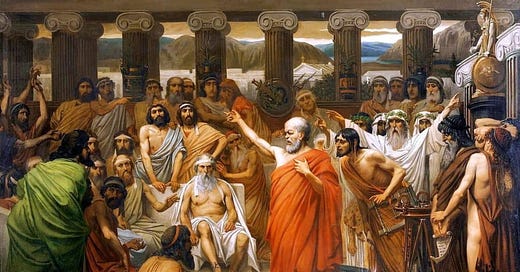When the origin story of Western philosophy is told, it often begins by contrasting it against the previously prevailing system through which life was interpreted. In ancient Greece, this was the poetic tradition. Supported chiefly by the works of Hesiod and Homer. Answer's to life's questions were either found in the epic myths themselves or those myths were used to endorse an interpretation. Philosophy disagreed with this approach and instead asked if there aren't perhaps other ways to interpret phenomena, ways that fell outside the domain of gods and heroes.
For example, Thales of Miletus—who is credited with being the first Western philosopher—predicted a solar eclipse in advance of its happening through his understanding of astronomy and mathematics. He Explained it as merely a cosmic event, rather than being the will of displeased gods, needing to be interpreted by a priest. Thales' approach to explaining phenomena disagreed with his contemporaries, he disagreed with the consensus of interpreting happenings through the lens of myth and legend. This counter-intuitive approach is another definitive facet of philosophy that I will be unpacking in the present article, as a part of my series on defining philosophy.
Philosophy as disagreeability:
If there were to be no disagreement at all, there'd be no need for communication. We'd all be on the same proverbial page. For disagreement bears within it an implicit question: 'is there not another way?' That is what spurred Thales on in our example, 'is there not another way to interpret an eclipse?'
Consider another pre-Socratic philosopher, Heraclitus, who wrote that "One must know that war is common, and justice is strife, and that all things come about by way of strife and necessity." This verse sharply emphasises the point being made. That through disharmony—disagreeing—with the whole, the part is made manifest. Without delving too deeply into Heraclitus' philosophy, he claims that all things are one and he justifies this through his thesis of 'the unity of opposites.' That totality, by necessity, contains within itself all contradictions. Thus it is through strife and disagreement that facets of existents are revealed. Heraclitus' asserts that this knowledge is available to all those who would listen to the logos. Logos here meaning ‘divine law’ or ‘ordering principle,’ which for Heraclitus was change, that is, how things differ.
The same notion is echoed in the East. The Taoists equally conceived of a paradoxical idea in the contradictory nature of the Tao. Consider the 11th verse of the Tao Te Ching:
"Thirty spokes are joined together in a wheel, but it is the centre hole that allows the wheel to function.
We mould clay into a pot, but it is the emptiness inside that makes the vessel useful.
We fashion wood for a house, but it is the emptiness inside that makes it liveable.
We work with the substantial, but the emptiness is what we use.”
Opposite characteristics are united in defining the same ineffable law, the Tao. Moreover, the negative here too as with Heraclitus is the definitive trait. Through strife justice is found, emptiness (or absence) makes some things useful. These are counter-intuitive notions that disagree with some of our prejudices.
Whilst there is parity in Eastern and Western conceptions about the unity of existence, when the question about what is to be done with such knowledge, East and West diverge—disagree. The East strives for harmony with the whole. While the West spends its time analysing all the constituents of reality. Hence, in part, why science emerged in Europe first. Science's reductivism isolates and breaks down facts for analysis. This is also why Eastern spiritual traditions attract Westerners today, meanwhile Western spirituality is drowning in nihilism.
Structuralism:
Continuing on with the theme of disagreeability, let us turn to the contributions structuralism made to philosophy. For instance, Ferdinand de Sassure argued—among many other things—that meaning is negative. In claiming this, he is trying to communicate that the meaning of words is equally derived from what we assigned to them, as well as from what is not assigned to them. Concluding that meaning is negative stems from another notion, that the 'sign,' the lettering, is arbitrary. That there is no objective basis for what these signs signify.
Take the alphabet for instance, there is no external justification for why we should associate the 'c/k' sound with the letters we use to represent said sound. Moreover, by making the association between those letters and that sound, it is simultaneously implied that all other letters of the alphabet do not cohere to said sound. Given that there are no intrinsic grounds to justify why these letters should be pronounced as such, we are thus left with the justification that 'c/k' represent the 'c/k' sound because these letters are not s or q or b etc. This is the reasoning behind why meaning is conceived of as negative. There definition depends on what they are not.
Conclusion:
Consider again Thales questioning whether there might be another way to explain phenomena. His disagreement contradicted the accepted wisdom that relied on myths for explanations. The meaning of his efforts are negatively defined by differing from his contemporary norms.
Philosophy is disagreeing. However, not an obstinate contrarianism contradicting for the sake of it. No, it is a disagreement that is guided by reason and sparked by curiosity. Philosophical disagreement is a constructive discontent. Even if a critique doesn't answer the question at hand, it at least serves to dissuade other's from pursuing this faulty line of reasoning any further. Additionally, as I have argued in this article, this disagreement is meaningful precisely because it is different with what already is, because it is what is not.



